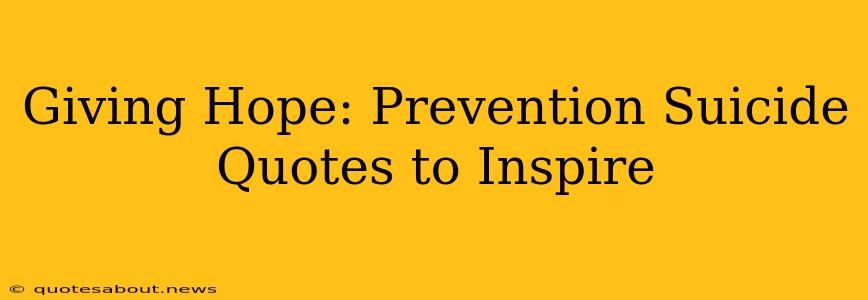Suicide is a devastating issue affecting countless individuals and families worldwide. While there's no single solution, fostering hope and providing support are crucial steps in suicide prevention. This article explores the power of inspirational quotes in offering comfort, strength, and a renewed sense of purpose to those struggling with suicidal thoughts. We'll delve into the impact of these words, examine some powerful examples, and address frequently asked questions surrounding suicide prevention.
Why are inspirational quotes helpful in suicide prevention?
Inspirational quotes, while not a replacement for professional help, can serve as powerful reminders of hope and resilience during times of despair. They offer a brief respite from overwhelming negativity, offering a different perspective and potentially reigniting a desire to live. These words can resonate deeply, validating feelings and offering a sense of connection with others who have faced similar struggles. They can be a source of strength when hope feels lost.
What are some powerful quotes that offer hope?
Many quotes offer profound messages of hope and resilience, reminding us of our inherent worth and the potential for brighter days. Here are a few examples:
-
"The oak sleeps in the acorn; the bird waits in the egg; and in the highest vision of the soul a waking angel stirs. Dreams are the seedlings of realities." - James Allen: This quote speaks to the potential within each of us, even in the darkest of times. It emphasizes the power of hope and the possibility of growth and transformation.
-
"What lies behind us and what lies in front of us, pales in comparison to what lies inside us." - Ralph Waldo Emerson: This quote reminds us of our inner strength and resilience. It suggests that our internal resources are far greater than any external challenges we face.
-
"The best and most beautiful things in the world cannot be seen or even touched - they must be felt with the heart." - Helen Keller: This quote encourages us to appreciate the beauty that exists, even when it's difficult to see. It reminds us of the importance of emotional connection and inner peace.
-
"Our greatest glory is not in never falling, but in rising every time we fall." - Ralph Waldo Emerson: This quote is a testament to resilience and the ability to overcome adversity. It emphasizes that setbacks are a natural part of life and that we have the capacity to bounce back.
What if someone I know is talking about suicide?
This is a critical situation requiring immediate action. Do not hesitate to reach out for help. You can:
- Talk to them directly: Express your concern, listen without judgment, and let them know you care.
- Encourage them to seek professional help: Offer to help them find a therapist, counselor, or hotline.
- Contact a crisis hotline or emergency services: If you believe the person is in immediate danger, call emergency services.
What resources are available for suicide prevention?
Numerous resources offer support and assistance to individuals struggling with suicidal thoughts and their loved ones. These include:
- The National Suicide Prevention Lifeline (in the US): 988
- The Crisis Text Line: Text HOME to 741741
- The Trevor Project (for LGBTQ youth): 1-866-488-7386
These resources provide confidential support, crisis intervention, and referrals to mental health services.
Can quotes actually save lives?
While quotes alone cannot save lives, they can be a crucial part of a larger support system. They offer a message of hope and encouragement, reminding individuals of their inherent worth and the potential for brighter days. Combined with professional help and a supportive network, these powerful words can contribute significantly to someone's recovery journey. It is vital to remember that seeking professional help is a critical step in suicide prevention.
How can I support someone struggling with suicidal thoughts?
Supporting someone considering suicide requires empathy, patience, and a willingness to listen without judgment. Be present, validate their feelings, and offer practical assistance in finding help. Let them know they are not alone and that there is hope for recovery. Your support could make a significant difference.
By spreading awareness, offering support, and utilizing available resources, we can work together to prevent suicide and create a more hopeful future for everyone. Remember, it's okay to ask for help, and you are not alone.

